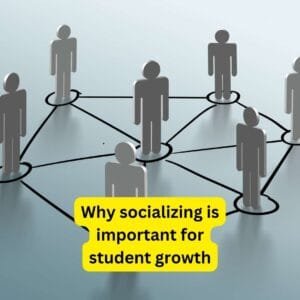Socializing plays a vital role in the growth and development of students. It is not just about having fun; social interactions are crucial for various aspects of a student’s life, including academic performance.
Benefits of Socializing for Student Growth
Improved Communication Skills: Socializing helps students hone their verbal and non-verbal communication skills, essential for personal and professional success.
Increased Self-Confidence: By engaging with peers, students gain the confidence to express themselves and share their thoughts and ideas.
Enhanced Social Skills: Socializing teaches students how to navigate different social situations, fostering adaptability and interpersonal relationships.
Fostering Empathy and Understanding: Interaction with diverse individuals promotes empathy and understanding of different perspectives.
Building Strong Relationships: Developing friendships and connections creates a supportive network that contributes to overall well-being.

Academic Benefits of Socializing
Peer Collaboration and Study Groups: Socializing facilitates collaboration with classmates, enhancing learning through shared knowledge and group study sessions.
Expanded Knowledge through Diverse Perspectives: Interacting with peers from diverse backgrounds broadens students’ understanding and enriches their academic experiences.
Increased Participation in Group Activities: Social connections encourage participation in group projects and discussions, leading to a more collaborative learning environment.
Improved Teamwork Skills: Through socializing, students develop essential teamwork skills that are valuable for academic group work and future career endeavors.
Mental Health Benefits of Socializing
Reduced Feelings of Isolation and Loneliness: Social interactions combat feelings of isolation and loneliness, fostering a sense of belonging and support.
Lower Levels of Stress and Anxiety: Positive social connections help in reducing stress and anxiety levels among students.
Boosted Happiness and Well-being: Engaging in social activities fosters a sense of happiness and overall well-being.
Increased Resilience and Coping Skills: Building strong social connections enhances students’ ability to cope with challenges and setbacks, promoting resilience.
Socializing in the Digital Age
Impact of Social Media on Social Interactions: Discuss the influence of social media on students’ social interactions and relationships, both positive and negative.
Balancing Online and Offline Interactions: Highlight the importance of balancing digital communication with face-to-face interactions for healthy social development.
Encouraging Face-to-Face Communication: Emphasize the value of in-person communication for building deeper connections and meaningful relationships.
Overcoming Socialization Challenges
Introverted Students and Social Anxiety: Address challenges faced by introverted students and provide tips for overcoming social anxiety.
Cultivating Social Skills through Practice: Encourage students to practice social skills through small interactions and gradually build confidence.
Seeking Support from Counselors or Mentors: Suggest seeking professional support from counselors or mentors to navigate socialization challenges effectively.
Tips for Effective Socializing
Joining clubs and organizations can help in expanding social networks.
Attend social events to meet new people and engage in conversations.
Participate in group projects to develop teamwork skills.
Engage in extracurricular activities to bond with peers and build lasting friendships.
Importance of Joining Clubs and Organizations
Joining clubs and organizations allows students to connect with like-minded individuals.
It provides opportunities to develop leadership skills and foster teamwork.
Benefits of Attending Social Events and Gatherings
Social events provide a platform for students to socialize and network with others.
It helps in enhancing communication skills and creating memorable experiences.
Building Meaningful Connections
Authenticity in relationships is key to building trust and mutual respect.
Active listening and showing empathy towards others strengthens emotional bonds.
Maintain open communication to avoid misunderstandings and nurture healthy relationships.
Resolving conflicts respectfully promotes understanding and growth in relationships.
The Role of Authenticity in Relationships
Being authentic in relationships fosters genuine connections and builds a strong support system.
Authenticity encourages honesty and transparency, leading to deeper and more meaningful connections.
Importance of Active Listening
Active listening promotes understanding and empathy, fostering meaningful interactions and relationships.
It shows respect and care for the other person’s thoughts and feelings, strengthening the bond between individuals.
Balancing Social Life and Academic Responsibilities
Effective time management strategies are essential for balancing social activities and academic commitments.
Setting boundaries for social engagements ensures a healthy balance between personal life and studies.
Prioritizing academic goals while still making time for social interactions helps maintain overall well-being.
Strategies for Effective Time Management
Planning and organizing tasks efficiently helps in managing academic responsibilities and social engagements.
Setting achievable goals and deadlines allows students to allocate time effectively for studies and social activities.
Creating a Supportive Social Environment
Surrounding oneself with positive influences fosters a supportive and nurturing social environment.
Seeking mentorship and guidance from trustworthy individuals can provide valuable advice and support.
Being a supportive friend to others strengthens relationships and creates a reciprocal support system.
FAQs:
Why is socializing important for student growth?
Socializing helps students develop essential communication skills, boost self-confidence, and cultivate empathy and understanding in interpersonal relationships. It also contributes to improved academic performance and mental well-being.
How does socializing benefit students academically?
Socializing allows students to engage in peer collaboration, form study groups, and gain diverse perspectives. It enhances participation in group activities and fosters teamwork skills critical for academic success.
What are the mental health benefits of socializing for students?
Socializing reduces feelings of isolation and loneliness, lowers stress levels, and increases happiness and well-being. It also promotes resilience and strengthens coping mechanisms, improving overall mental health.
How can students balance socializing and academic responsibilities effectively?
Effective time management, setting boundaries for social activities, and prioritizing academic goals are essential in maintaining a healthy balance between social life and academic commitments.
What role does socializing play in the digital age for students?
In the digital age, social media impacts social interactions, emphasizing the importance of balancing online and offline interactions. Encouraging face-to-face communication is crucial in fostering meaningful social connections.
Conclusion:
In conclusion, socializing plays a crucial role in student growth, offering a range of benefits from improved communication skills to enhanced mental well-being. By engaging in social interactions, students not only excel academically but also develop vital life skills and forge meaningful relationships that contribute to their overall personal and academic success. It is imperative for students to prioritize socializing to cultivate a well-rounded and fulfilling educational experience that extends beyond the classroom.



